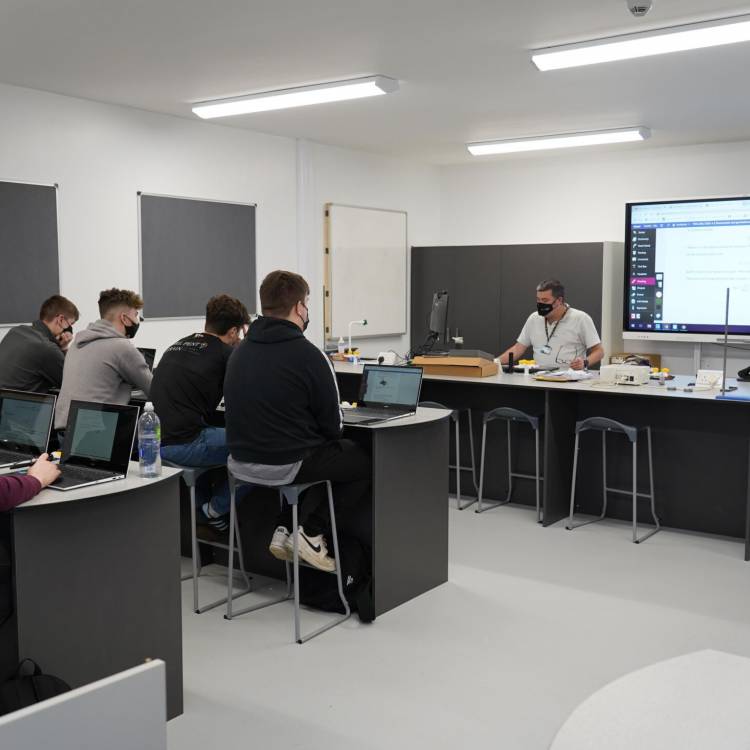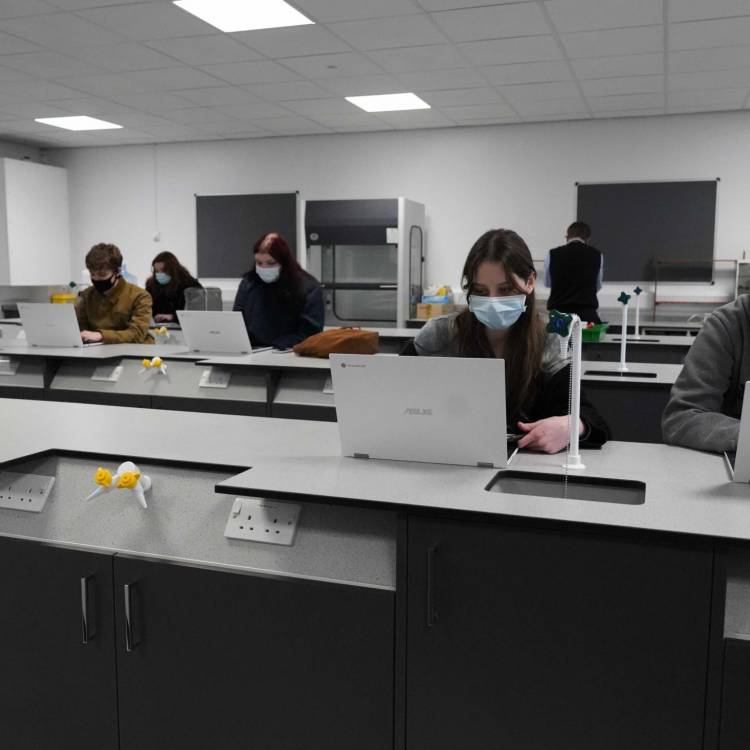Grŵp Llandrillo Menai'n mynd i'r afael ag allgau digidol
Gan adeiladu ar brofiadau yn ystod y pandemig, mae Grŵp Llandrillo Menai (GLLM) wedi sefydlu nifer o fesurau i wella cynhwysiad digidol ymhlith myfyrwyr a staff.
Mae'r 'Datganiad Hawl Digidol' sydd newydd ei gyhoeddi gan y Grŵp yn anelu at sicrhau fod gan bob myfyriwr fynediad at gyrsiau yn ddigidol ac o bell, a hynny trwy ddarparu offer a chysylltiad i'r we.
Mae hefyd yn nodi sut y bydd y Grŵp yn rhoi hyfforddiant a chefnogaeth i staff i ddelifro rhaglenni a gwasanaethau'n ddigidol.
Mae £1.5m y flwyddyn wedi ei glustnodi i gefnogi myfyrwyr a staff i fedru gweithredu'n ddigidol, ac mae nifer o brosiectau ar droed yn barod. Mae'r rhain yn cynnwys gosod camerâu mewn ystafelloedd dysgu, rhaglenni hyfforddi mewn dysgu ac addysgu digidol, buddsoddiad sylweddol mewn technoleg a dyfeisiadau symudol i gefnogi dysgu yn y coleg a gartref, a phecynnau dysgu digidol mewn meysydd galwedigaethol.
Yn sgil cyllid gan Lywodraeth Cymru, mae dyfeisiadau digidol a MiFis ar gael i ddysgwyr fel y gallant ddysgu o bell a hunan-ddysgu. Yn ystod y ddwy flynedd ddiwethaf, mae dros 1,000 o ddyfeisiadau chromebook wedi cael eu rhoi ar fenthyg i fyfyrwyr.
Mae defnydd y Grŵp o e-adnoddau wedi cynyddu o oddeutu 20,000 yn 2015-16 i 204,000 yn 2020/21, ac mae'r defnydd o e-lyfrau y mwyaf o blith holl golegau Addysg Bellach Cymru, a gyda'r mwyaf yn y DU.
Eglurodd Dafydd Evans, Prif Weithredwr GLLM: "Mae Covid-19 wedi arwain at newid sylfaenol yn y ffordd mae cyfleoedd addysgol yn cael eu delifro i fyfyrwyr. Rydyn ni wedi dysgu o'r pandemig mor bwysig yw digideiddio o fewn y sector addysg.
"Mae nifer o agweddau ar fywyd coleg yn fwyfwy droi'n ddigidol ac mae myfyrwyr yn gynyddol fynd arlein i gyfathrebu, cael gwybodaeth am eu cyrsiau, a mynediad at gefnogaeth.
"Mae'r trawsnewidiad hwn yn rhoi cyfle i gynnig gwasanaeth mwy hygyrch ac ymatebol i'n myfyrwyr. Wedi dweud hynny, mae delifro cyrsiau a gwasanaethau cefnogol arlein yn dibynnu ar allu dysgwyr i gael mynediad atynt a rhyngweithio mewn ffyrdd sy'n ateb eu anghenion nhw."
Er bod y Datganiad yn ymwneud â phob myfyriwr ac aelod o staff, un o'r prif flaenoriaethau yw mynd i'r afael ag anghenion dysgwyr sydd wedi'u allgau'n ddigidol ar hyn o bryd - yn cynnwys rhai sydd gydag anghenion dysgu arbennig neu sydd angen cefnogaeth ychwanegol am eu bod yn byw mewn ardal ddifreintiedig.
Mae'r Datganiad yn nodi nifer o ffactorau sy'n gallu cyfrannu at allgau digidol ymhlith myfyrwyr. Mae pobl sydd wedi'u hynysu'n gymdeithasol neu sydd dan anfantais economaidd yn dueddol o gael llai o fynediad at y rhyngrwyd, dyfeisiadau a gwasanaethau arlein. Mae pobl gydag anableddau yn llai tebygol nag eraill o ddefnyddio'r rhyngrwyd a chael mynediad at y we gartref.
Yn ogystal, mae diffyg neu fand eang ac isadeiledd symudol gwael yn fwy tebygol o effeithio pobl ifanc a phobl mewn ardaloedd gwledig, sy'n amlwg yn ystyriaeth bwysig i goleg sy'n rhoi addysg i fyfyrwyr mewn nifer o ardaloedd gwledig ac anghysbell.
Ychwanegodd Dafydd: "Mae'r ddibyniaeth gynyddol ar dechnoleg ddigidol yn golygu fod angen i fyfyrwyr fedru cysylltu â'r rhyngrwyd a chael mynediad i ddyfeisiadau priodol. Ond mae hefyd yn golygu fod gofyn am sgiliau digidol penodol er mwyn medru mynd arlein a chymryd rhan mewn cyrsiau.
"Trwy gyflawni'r camau sydd wedi'u cynnwys yn ein Datganiad Hawl Digidol, rydyn ni'n awyddus i arwain y ffordd o ran mynd i'r afael â'r anghydraddoldeb demograffig a gwneud yn sicr fod gan bob myfyriwr ac aelod o staff yr un cyfle i gymryd rhan yn ein cyrsiau a'n gwasanaethau mewn modd digidol."
The newly published 'Digital Entitlement Statement' aims to make sure that all learners can access courses digitally and remotely through the provision of equipment and connectivity.
It also addresses how the Grŵp will provide training and support for staff to deliver programmes and services digitally.
With £1.5m allocated per annum to digitally support learners and staff, many initiatives have already been rolled out. These include the installation of classroom cameras, extensive training in digital teaching and learning, significant investment in mobile technology and devices to support digital learning in college and at home, and development of excellent vocational digital learning packages.
Thanks to Welsh Government funding, the Grŵp is making digital devices and MiFis available to learners to enable remote learning and self-study. Over 1,000 chromebooks have been lent to learners in each of the last two academic years.
The Grŵp’s e-resource usage has increased from just under 20,000 in 2015-16 to 204,000 in 2020/21. It is not only the highest user of e-books out of all the Further Education colleges in Wales, but is also amongst the highest in the UK.
GLLM Chief Executive Dafydd Evans explained: "Covid-19 has fundamentally changed the way we deliver education opportunities to learners. We have learned from the pandemic how important digitalisation is within the education sector.
"More strands of college life are becoming ‘digital by default’ and learners are increasingly going online to communicate, to access information about their courses, and access support.
"This transformation offers learners a more intuitive, accessible and responsive service delivery. However, the successful delivery of online courses and support services relies on the ability of learners to access and interact with them in ways that suit their needs."
Whilst the Statement applies to all learners and staff, a key priority is to address the needs of learners who are currently digitally excluded - including those with specific learning needs or who require additional support because they live in an area of deprivation.
The Statement identifies many factors contributing to digital exclusion among learners. The socially isolated and economically disadvantaged tend to have more limited access to, and use of, the internet, devices and online services. People with disabilities are less likely to use the internet or have access at home than people without.
Furthermore, poor - or no - broadband and mobile infrastructure is more likely to be experienced by younger people and those living in remote areas. This is a particular factor for a college Grŵp that provides education to learners in a very geographically dispersed and rural area.
Dafydd added: "The increasing reliance on digital technology not only requires learners to be able to connect to the internet and have access to appropriate devices. It also means that they will need to utilise specific digital skills in order to get online and take part in their courses.
"Through the achievement of the actions included in our Digital Entitlement Statement, we want to lead the way in addressing some of the demographic inequalities and make sure that all learners and staff have the same opportunity to interact with our courses and services digitally."

